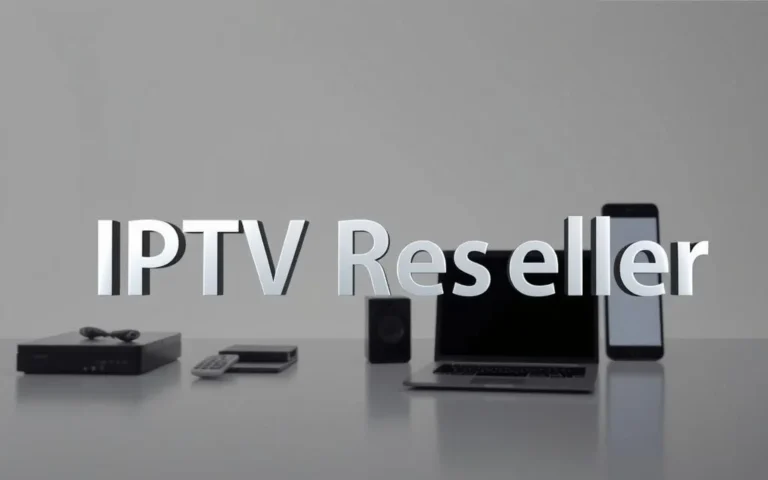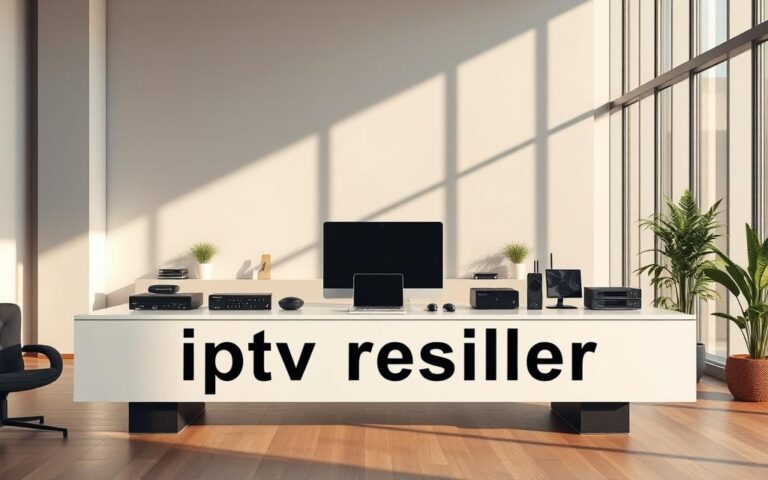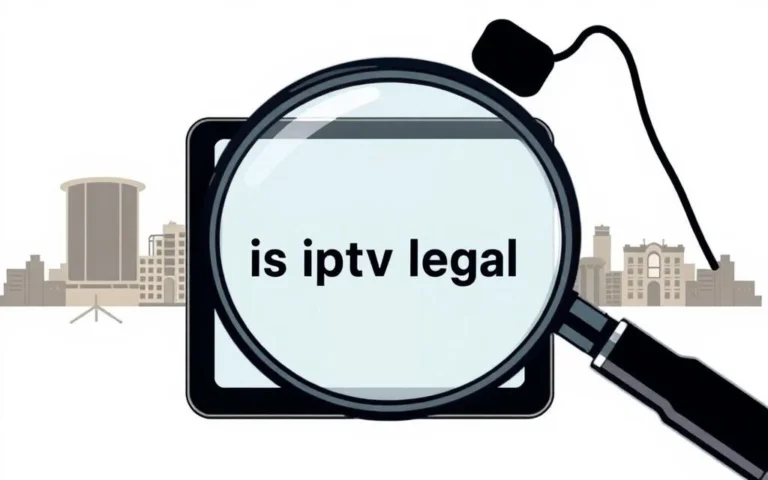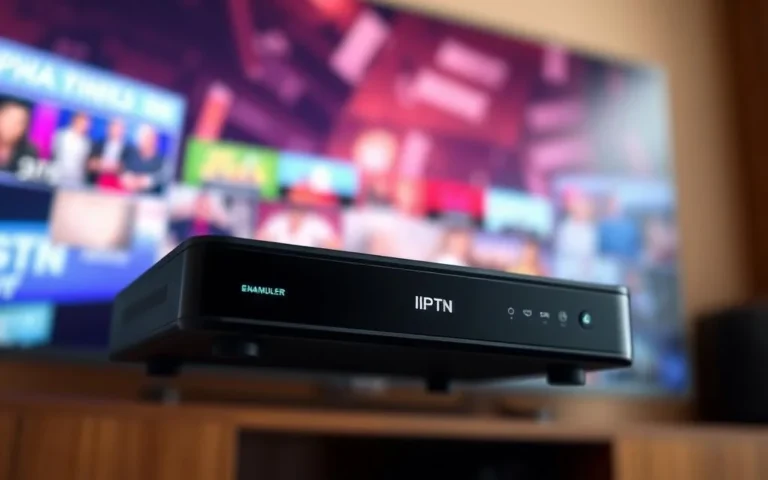is iptv legal in usa?
As streaming services continue to gain popularity, many Americans are turning to IPTV as an alternative to traditional television. But what exactly is IPTV, and is it legal to use it in the United States?
IPTV, or Internet Protocol Television, refers to the delivery of television content over internet protocol networks. This technology allows users to stream media content directly to their devices, providing a flexible and often more affordable alternative to conventional TV services.
Table of Contents
The legality of IPTV in the USA is a complex issue, involving considerations of copyright laws, service provider legitimacy, and user compliance. Understanding the legal landscape is crucial for consumers to avoid potential legal repercussions.
Key Takeaways
- IPTV delivers television content via internet protocol networks.
- The legality of IPTV depends on the service provider and content offered.
- Users must comply with copyright laws when using IPTV services.
- Not all IPTV services are legitimate; some may infringe on copyrights.
- Understanding IPTV legality is crucial for consumers.
Understanding IPTV: What It Is and How It Works
IPTV, or Internet Protocol Television, is revolutionizing the way we consume media by delivering television content over the internet. This technology allows for a more personalized and flexible viewing experience compared to traditional television services.
Definition and Basic Functionality of IPTV
IPTV refers to the delivery of television content through internet protocols. Unlike traditional broadcast or cable formats, IPTV uses a broadband connection to stream content directly to the user’s device. This can include live TV, on-demand content, and other interactive services.
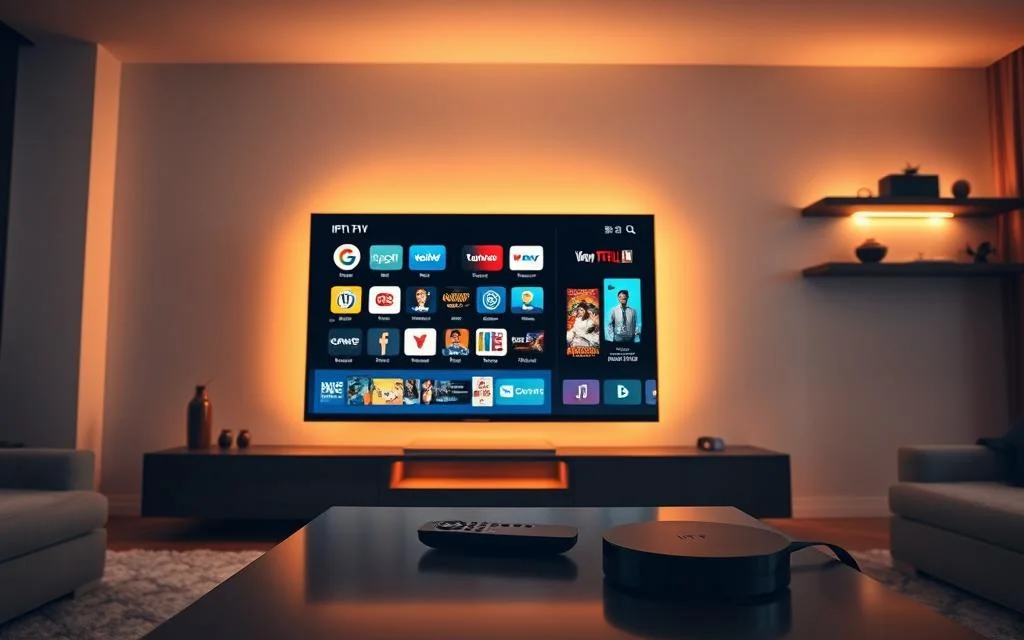
Different Types of IPTV Services Available
There are several types of IPTV services available, catering to different user preferences. These include:
- Live TV: Streams live television channels over the internet.
- Video on Demand (VOD): Allows users to select and watch content at their convenience.
- Catch-up TV: Enables viewers to watch previously aired content.
- Start-over TV: Lets users restart a live program from the beginning.
How IPTV Differs from Traditional Cable and Satellite TV
IPTV differs significantly from traditional cable and satellite TV in its delivery method. While cable and satellite TV rely on dedicated infrastructure, IPTV uses the internet, offering greater flexibility and potentially lower costs. Additionally, IPTV can provide more interactive features and personalized content recommendations.
The Legal Framework Governing IPTV in the USA
The legal landscape governing IPTV in the USA is complex and multifaceted. IPTV services operate within a framework that includes copyright laws, the Digital Millennium Copyright Act (DMCA), and regulations set forth by the Federal Communications Commission (FCC).
Copyright Laws Applicable to Television Content
Copyright laws play a crucial role in determining the legality of IPTV services. These laws protect the intellectual property rights of content creators, including TV shows and movies. IPTV providers must obtain the necessary licenses to distribute copyrighted content.
Key aspects of copyright law applicable to IPTV include:
- Obtaining licenses for copyrighted content
- Compliance with copyright infringement laws
- Respecting the rights of content creators
Digital Millennium Copyright Act (DMCA) Provisions
The DMCA is a significant piece of legislation that affects IPTV services. It provides a framework for copyright holders to protect their content online and holds service providers accountable for copyright infringement.
The DMCA’s key provisions include:
- Notice-and-takedown procedures for copyright infringement
- Protections for service providers that comply with DMCA requirements
Federal Communications Commission (FCC) Regulations on IPTV
The FCC regulates various aspects of IPTV services, including signal carriage, customer information privacy, and emergency alert systems. IPTV providers must comply with these regulations to operate legally.

Understanding these regulations is crucial for both IPTV providers and consumers. Compliance with copyright laws, DMCA provisions, and FCC regulations ensures that IPTV services operate within the legal framework of the USA.
Is IPTV Legal in USA? The Definitive Answer
IPTV’s legal status in the USA is a multifaceted issue, influenced by various factors including copyright laws and service provider practices. The legality of IPTV services hinges on whether they operate with proper licensing and adhere to copyright regulations.
Distinguishing Between Legal and Illegal IPTV Services
Legal IPTV services obtain the necessary licenses and permissions to broadcast content, whereas illegal services do not. Legal IPTV providers have agreements with content owners, ensuring that they comply with copyright laws.
Gray Areas in IPTV Legality and Interpretation
Despite clear regulations, there are gray areas in IPTV legality. Some services may claim to be legal by operating in jurisdictions with lenient laws, yet still, violate US copyright laws. Understanding these nuances is crucial for consumers.
Recent Legal Precedents and Court Rulings on IPTV
Recent court rulings have shed light on IPTV legality. For instance, courts have ruled against IPTV services that stream copyrighted content without permission. The following table summarizes key aspects of IPTV legality:
| Aspect | Legal IPTV | Illegal IPTV |
| Licensing | Has proper licensing | Lacks proper licensing |
| Copyright Compliance | Complies with copyright laws | Violates copyright laws |
| Content Source | Obtains content from authorized sources | Streams content without authorization |
In conclusion, the legality of IPTV in the USA depends on the service provider’s compliance with copyright laws and licensing requirements. Consumers must be cautious and choose services that operate within the legal framework.
How to Identify Legal IPTV Services
As IPTV continues to gain popularity, understanding how to identify legitimate services is essential. With numerous providers available, consumers need guidance on what to look for to ensure they’re subscribing to a legal service.
Step 1: Check for Legitimate Licensing and Content Agreements
Legal IPTV services have proper licensing agreements with content providers. Look for information about their licensing and content rights on their official website or by contacting their customer support.
Step 2: Recognize Red Flags That Indicate Illegal IPTV Operations
Be cautious of IPTV services that:
- Offer extremely low prices compared to other providers
- Lack transparent information about their company or operations
- Have numerous negative reviews or complaints about service quality
These red flags can indicate that the service is operating illegally.
Step 3: Verify the Legitimacy of an IPTV Provider
To further verify the legitimacy of an IPTV provider, follow these sub-steps:
Researching Provider Background
Investigate the provider’s history, reputation, and any available ratings from reputable sources. A legitimate provider will have a verifiable presence in the market.
Confirming Content Rights
Check if the IPTV service has the necessary rights to broadcast the channels and content it offers. This information is usually available on their website or through customer support.
By following these steps, consumers can significantly reduce the risk of subscribing to an illegal IPTV service. It’s crucial to be diligent and thorough in the research process to ensure a safe and legal viewing experience.
Steps to Ensure You’re Using IPTV Legally
Ensuring you’re using IPTV legally involves several key steps that can protect you from potential legal issues. With the increasing popularity of IPTV services, understanding these steps is crucial for consumers.
Step 1: Research IPTV Providers Before Subscribing
Before signing up for an IPTV service, it’s essential to research the provider thoroughly. Look for reviews, check their official website, and verify if they have the necessary licenses to operate. A legitimate IPTV provider will have transparent information about their service and content offerings.
Step 2: Review Terms of Service and User Agreements
Understanding the terms of service and user agreements is vital. These documents outline what you’re allowed to do with the service and what content you’re accessing. Make sure you’re comfortable with and understand these terms before agreeing.
Step 3: Maintain Compliance with Copyright Laws
Maintaining compliance with copyright laws is critical when using IPTV services. This involves understanding what content you’re allowed to access and how you can use it.
Avoiding Unauthorized Content Sharing
One key aspect of complying with copyright laws is avoiding the sharing of unauthorized content. Be cautious about sharing links or streams that could infringe on copyright holders’ rights.
Understanding Personal Use Limitations
IPTV services often come with limitations on personal use. Understand that these services are typically for personal viewing only and that redistributing content can violate these terms and copyright laws.
By following these steps, you can significantly reduce the risk of legal issues associated with IPTV usage. Staying informed and cautious is key to enjoying IPTV services legally.
Legal Consequences of Using Unauthorized IPTV Services
The use of unauthorized IPTV services can lead to severe legal repercussions in the United States. As the popularity of IPTV continues to grow, so does the risk of facing legal consequences for using unlicensed services.
Potential Civil and Criminal Penalties for Users
Users of unauthorized IPTV services may face both civil and criminal penalties. Civil penalties can include significant fines for copyright infringement, while criminal penalties can result in imprisonment. The Digital Millennium Copyright Act (DMCA) provisions make it illegal to circumvent copyright protection measures, and violators can face severe penalties.
Recent Enforcement Actions Against IPTV Users and Providers
Recent years have seen increased enforcement actions against both IPTV users and providers. Law enforcement agencies have been cracking down on illegal IPTV operations, resulting in numerous arrests and prosecutions. For instance, in 2023, several major IPTV services were shut down due to copyright infringement.
How Authorities Track and Prosecute Illegal IPTV Usage
Authorities use various methods to track and prosecute illegal IPTV usage, including monitoring internet traffic, analyzing user data, and collaborating with internet service providers (ISPs). They also employ sophisticated technologies to identify and dismantle illegal IPTV networks. Users of unauthorized IPTV services risk being identified and prosecuted.
In conclusion, the legal consequences of using unauthorized IPTV services are significant and can have lasting impacts on individuals. It is crucial for users to understand these risks and opt for licensed IPTV services to avoid legal repercussions.
Legal IPTV Alternatives in the United States
The United States offers a variety of legal IPTV services that cater to different viewing preferences. With the rise of streaming, consumers have numerous options to access their favorite TV shows, movies, and live events.
Licensed Streaming Services with Live TV Options
Several licensed streaming services offer live TV options, providing an alternative to traditional cable and satellite TV. Some of the notable services include:
- Hulu with Live TV: Offers a range of channels, including sports, news, and entertainment.
- Sling TV: Provides customizable channel packages to suit different viewer preferences.
- YouTube TV: Offers a comprehensive channel lineup with features like unlimited DVR storage.
Network-Specific Streaming Platforms
Many networks now offer their own streaming platforms, allowing viewers to access their content directly. Examples include:
- NBCUniversal’s Peacock: Offers a vast library of TV shows, movies, and original content.
- HBO Max: Provides premium content, including popular TV series and movies.
- ESPN+: Dedicated to sports content, offering exclusive events and original programming.
Over-the-Top (OTT) Services That Comply with US Laws
OTT services deliver content directly over the internet, bypassing traditional distribution methods. These services are categorized into:
Subscription-Based Services
- Netflix: Known for its original content and vast library of movies and TV shows.
- Amazon Prime Video: Offers a wide range of content, including original series and movies, as part of the Amazon Prime membership.
Free Legal Streaming Options
- Tubi: Offers a wide range of free movies and TV shows, supported by ads.
- Pluto TV: Provides free access to a variety of TV shows, movies, and on-demand content, also supported by ads.
These legal IPTV alternatives in the US offer consumers flexibility and choice, ensuring that they can enjoy their preferred content legally and safely.
Best Streaming Devices for Legal IPTV Services
Choosing the right streaming device is crucial for a seamless IPTV experience. With various devices available, users can enjoy their favorite channels and on-demand content with ease.
Roku Devices: Features and IPTV Compatibility
Roku devices are popular among IPTV users due to their compatibility with various IPTV apps. The Roku Ultra and Roku Premiere are highly recommended for their fast performance and 4K streaming capabilities. To use IPTV on Roku, simply download the desired IPTV app from the Roku Channel Store.
Amazon Fire TV: Setup and Legal IPTV Apps
Amazon Fire TV devices, such as the Fire TV Stick 4K and Fire TV Cube, offer a robust IPTV experience. Users can sideload IPTV apps or find them directly in the Amazon Appstore. Fire TV’s voice control feature enhances the user experience.
Apple TV and Android TV Options for Legal IPTV
Apple TV devices support various IPTV apps, available through the App Store. For example, the Apple TV 4K offers high-quality streaming. Android TV devices, such as those from Sony and Google, also support IPTV apps, providing users with a range of choices.
Smart TVs with Built-in IPTV Capabilities
Many modern smart TVs come with built-in IPTV capabilities or support IPTV apps. Brands like Samsung, LG, and Vizio offer smart TVs with IPTV functionality, making it easy to access IPTV services directly on the TV without needing an external device.
When choosing a streaming device for IPTV, consider factors such as app availability, 4K support, and user interface. By selecting the right device, users can enjoy a superior IPTV experience.
Setting Up Legal IPTV: A Step-by-Step Guide
Setting up a legal IPTV service involves multiple steps, from choosing a provider to optimizing your network. Ensuring that each step is followed correctly is crucial for a seamless viewing experience.
Step 1: Select a Legal IPTV Service
The first step in setting up legal IPTV is to select a reputable and licensed IPTV service provider. Look for providers that have legitimate content agreements and comply with US copyright laws. Some key factors to consider include:
- The variety of channels and content offered
- Compatibility with different devices
- Customer service and support
- Pricing and subscription plans
Step 2: Choose and Configure Your Streaming Device
Once you’ve selected an IPTV service, you’ll need a compatible streaming device. Popular options include Roku, Amazon Fire TV, and Apple TV. Ensure your device is configured correctly by following the manufacturer’s instructions and checking for any software updates.
Step 3: Install and Set Up IPTV Apps
Most IPTV services have dedicated apps for various streaming devices. Navigate to your device’s app store, download the IPTV app, and follow the on-screen instructions to log in and configure your IPTV service.
Step 4: Optimize Your Network for IPTV Streaming
A stable and fast internet connection is essential for smooth IPTV streaming. Ensure your network meets the minimum speed requirements for your IPTV service, typically at least 25 Mbps for HD content. Consider using a wired Ethernet connection for the most reliable performance.
Step 5: Troubleshoot Common Setup Issues
Common issues during IPTV setup include buffering, poor video quality, and app crashes. Troubleshooting steps may include checking your internet speed, restarting your streaming device, or contacting your IPTV provider’s customer support for assistance.
By following these steps, you can ensure a successful setup of your legal IPTV service, providing you with a high-quality viewing experience.
The Future of IPTV Regulation in America
The future of IPTV regulation in the United States is a complex issue, influenced by technological advancements and legal considerations. As the IPTV industry continues to grow, it is essential to examine the factors that will shape its regulatory landscape.
Pending Legislation and Potential Regulatory Changes
Several legislative proposals are currently under consideration in the United States that could impact IPTV regulation. These include measures aimed at updating copyright laws, enhancing consumer protection, and promoting fair competition in the streaming market.
One key area of focus is the potential revision of the Copyright Act to better address the challenges posed by IPTV services. This could involve clarifying the liability of IPTV providers for copyright infringement and establishing clearer guidelines for content licensing.
Industry Self-Regulation Efforts and Standards
In addition to government regulation, the IPTV industry is also exploring self-regulation as a means of maintaining compliance with legal standards. This includes the development of industry-wide guidelines and best practices for IPTV providers.
A notable example is the establishment of the IPTV Association, which aims to promote responsible business practices among its members and advocate for the interests of the IPTV industry as a whole.
| Regulatory Aspect | Current Status | Potential Changes |
| Copyright Law | Ambiguous liability for IPTV providers | Clearer guidelines on copyright infringement |
| Consumer Protection | Limited oversight on IPTV services | Enhanced regulations to protect consumers |
| Industry Standards | Voluntary compliance with industry norms | Establishment of mandatory industry standards |
How Evolving Technology Affects IPTV Legality
The rapid evolution of technology is a significant factor influencing IPTV regulation. Advances in streaming technology, encryption methods, and content delivery networks are continually changing the IPTV landscape.
For instance, the adoption of cloud-based IPTV solutions is making it easier for providers to scale their services while maintaining high-quality streams. However, this also raises concerns about copyright infringement and the need for more robust content protection measures.
Predictions for the Legal IPTV Landscape
Looking ahead, the legal IPTV landscape in America is likely to be shaped by a combination of legislative updates, industry self-regulation, and technological innovation. As the regulatory environment evolves, IPTV providers will need to adapt to ensure compliance with new laws and standards.
One prediction is that there will be a greater emphasis on transparency and accountability within the IPTV industry, with providers being required to disclose more information about their content offerings and business practices.
Conclusion: Navigating the IPTV Landscape Legally
Navigating the IPTV landscape legally requires a comprehensive understanding of the complex regulatory environment surrounding IPTV services in the USA. As discussed, the legality of IPTV hinges on several factors, including the type of content being streamed and the licensing agreements in place.
To ensure compliance with US laws, it’s crucial to choose IPTV services that have legitimate licensing agreements and adhere to copyright laws. Services like Hulu, Sling TV, and YouTube TV are examples of legal IPTV alternatives that provide a range of channels and content while respecting intellectual property rights.
When selecting an IPTV provider, verifying their legitimacy and reviewing their terms of service is essential. This diligence helps in avoiding potential legal consequences associated with using unauthorized IPTV services. As the IPTV landscape continues to evolve, staying informed about regulatory changes and industry standards will be vital for both consumers and providers.
By making informed choices and staying abreast of the legal landscape, users can enjoy IPTV services while minimizing legal risks. Understanding is iptv legal in usa and navigating IPTV legality effectively ensures a safe and enjoyable viewing experience.
FAQ
What is IPTV?
IPTV, or Internet Protocol Television, is a service that delivers television content over the internet, rather than through traditional satellite or cable formats.
Is IPTV legal in the USA?
IPTV itself is not illegal, but its legality depends on the content it provides. Services that offer copyrighted content without permission are considered illegal.
What is the difference between IPTV and traditional TV?
IPTV delivers content via the internet, allowing for more flexibility and on-demand viewing, whereas traditional TV broadcasts content at a scheduled time through cable or satellite.
How can I identify a legal IPTV service?
Look for services that have legitimate licensing agreements with content providers, and check for transparency in their terms of service and user agreements.
What are the consequences of using an unauthorized IPTV service?
Users may face civil or criminal penalties, including fines, for accessing or distributing copyrighted content without permission.
Are there legal alternatives to IPTV?
Yes, there are several legal alternatives, including licensed streaming services like Hulu, Sling TV, and YouTube TV, as well as network-specific streaming platforms.
What is the best streaming device for IPTV?
Popular options include Roku, Amazon Fire TV, Apple TV, and Android TV, each offering various IPTV apps and compatibility with different services.
How do I set up a legal IPTV service?
Start by selecting a legal IPTV service, then choose a compatible streaming device, install the necessary apps, and configure your setup for optimal streaming.
What is the future of IPTV regulation in the USA?
The future may involve more stringent regulations, industry self-regulation efforts, and adaptations to evolving technology, potentially leading to clearer guidelines on IPTV legality.
Can I use IPTV on my smart TV?
Many smart TVs support IPTV apps, but compatibility varies by manufacturer and model. Check your TV’s app store for IPTV services.
What is IPTV GitHub?
IPTV GitHub refers to repositories on GitHub that host IPTV-related projects, including playlists and software. However, be cautious of potential copyright issues with some repositories.
How do authorities track illegal IPTV usage?
Authorities may track illegal IPTV usage through monitoring of internet traffic, reports from copyright holders, and other investigative methods.


